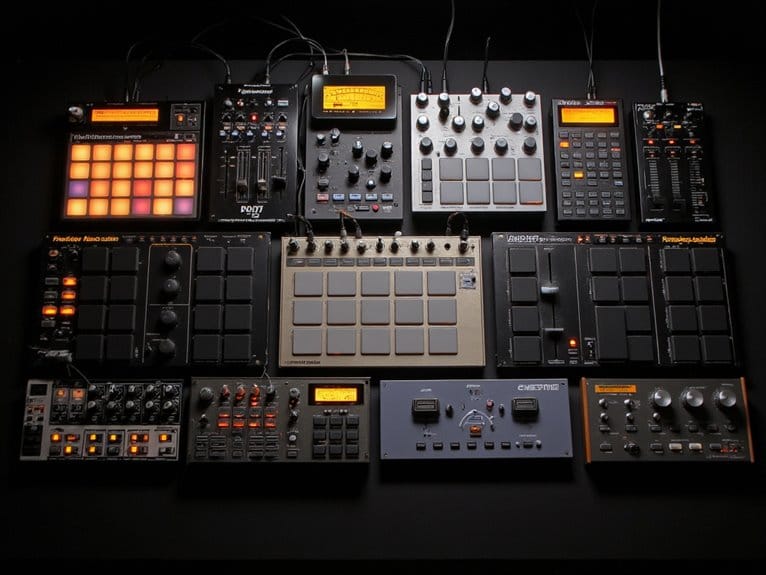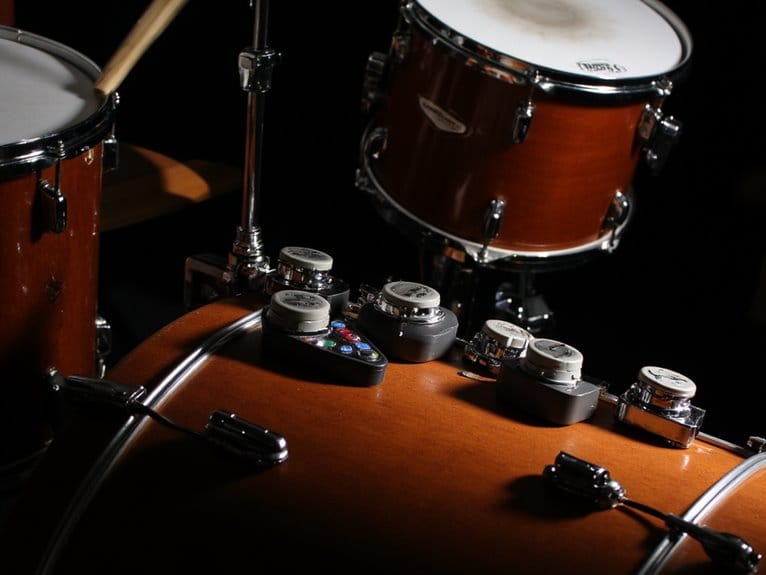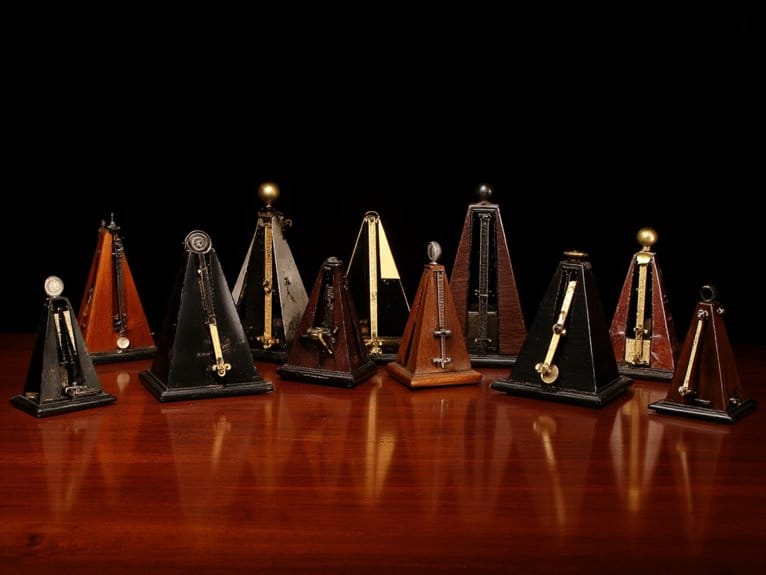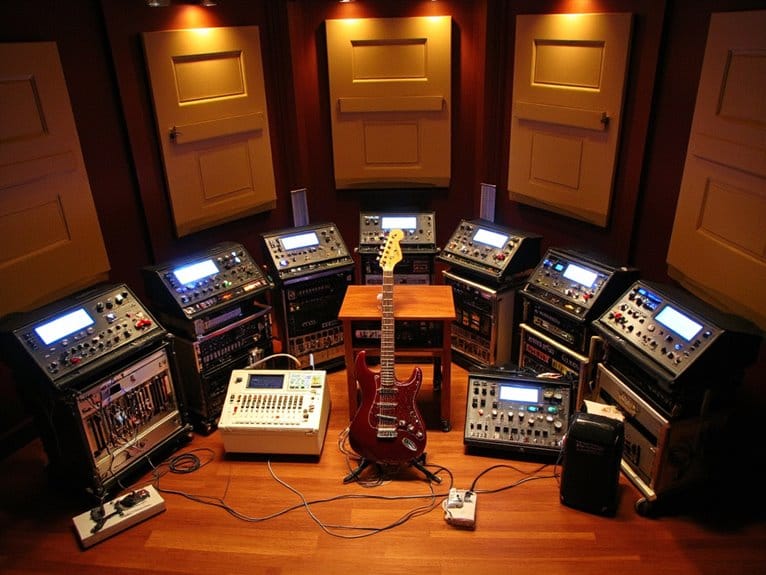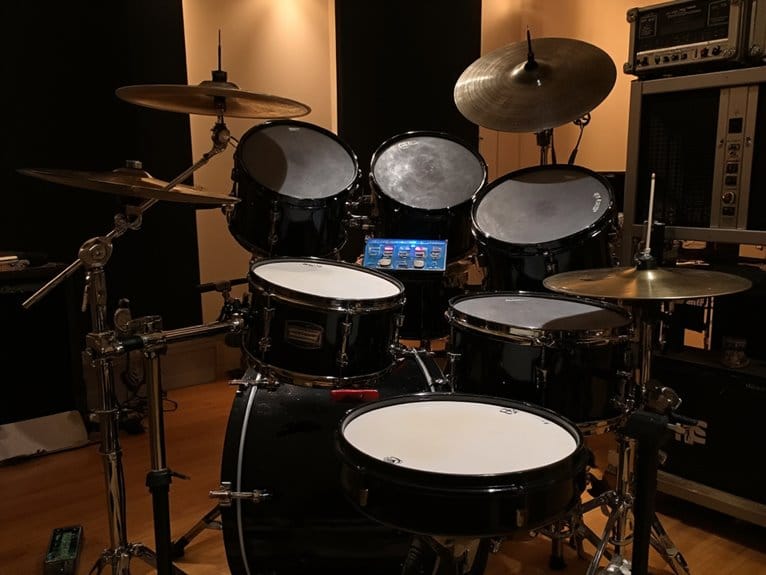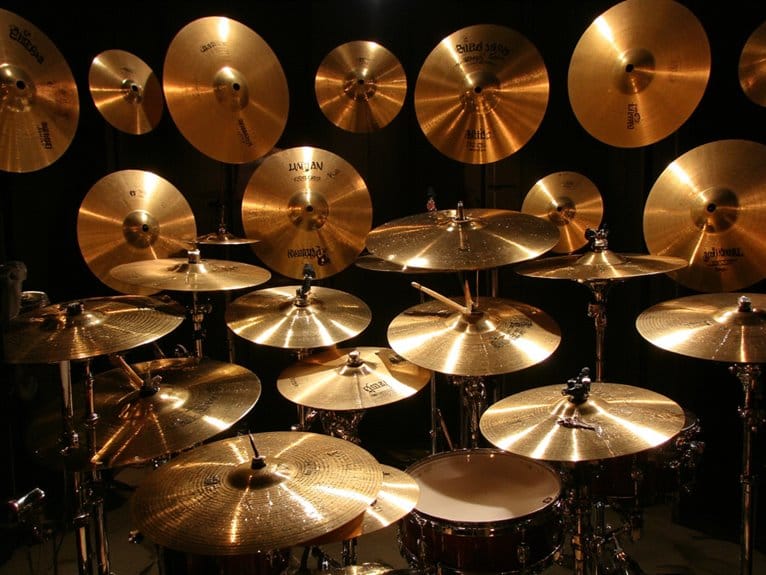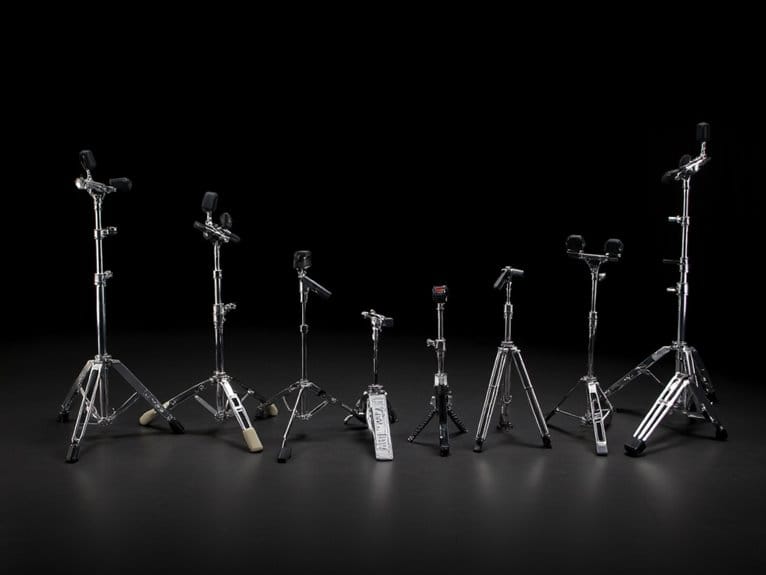Best Beat Machines for Hip Hop Production
After testing dozens of beat machines this year, I’d recommend the Donner STARRYPAD for its 48 assignable triggers and professional software bundle, the Liven BASS&BEATS for portable wavetable synthesis, and the Korg Volca Sample 2 for its engaging sequencer workflow. The Vangoa 25-key MIDI controller offers excellent value under $100, while the Alesis SR-18 delivers studio-grade drum sounds. Each machine excels in different areas, and understanding their specific strengths will help you make the perfect choice.
We are supported by our audience. When you purchase through links on our site, we may earn an affiliate commission, at no extra cost for you. Learn more.
Notable Insights
- Donner STARRYPAD offers 48 assignable triggers and velocity-sensitive pads, making it ideal for professional hip hop producers.
- Korg Volca Sample 2 provides 8-voice polyphony and double memory capacity, perfect for beginners creating hip hop beats.
- Liven BASS&BEATS combines wavetable bass synthesis with drum machine capabilities in a portable, mobile-friendly design.
- Look for machines with 44.1 kHz sampling rates, extensive effects libraries, and DAW compatibility for professional production quality.
- USB-C connectivity, MIDI in/out ports, and velocity-sensitive pads are essential features for seamless hip hop workflow integration.
Donner MIDI Pad Beat Maker Machine Professional (STARRYPAD)
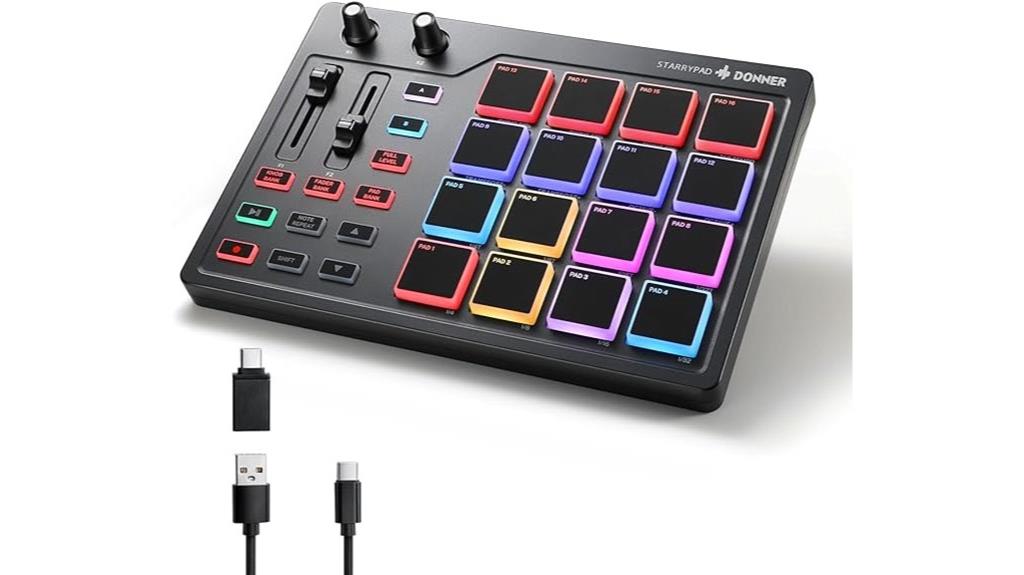
If you’re a producer who values versatility and wants professional-grade control without breaking the bank, the Donner STARRYPAD deserves serious consideration for your hip hop setup. This controller delivers 16 velocity-sensitive pads with customizable backlighting across seven colors, while three pad banks expand your arsenal to 48 assignable triggers for all-encompassing beat programming. The included faders, knobs, and buttons provide tactile control over your samples and effects, though I’ll admit the learning curve requires patience. Universal compatibility across iOS, Android, Mac, and Windows systems guarantees seamless integration with your existing workflow, while the bundled Melodics courses and Cubase LE software help newcomers navigate hip hop production fundamentals.
Best For: Hip hop producers and beat makers who want professional-grade pad control with extensive customization options and cross-platform compatibility at an affordable price point.
Pros:
- 48 total assignable pads across three banks with velocity-sensitive, backlit silicone surfaces and seven customizable colors
- Universal compatibility with iOS, Android, Mac, and Windows plus USB-C plug-and-play functionality and MIDI in/out capability
- Comprehensive software bundle including Melodics courses and Cubase LE with additional features like Tap Tempo and Note Repeats for enhanced performance
Cons:
- Steep learning curve that requires patience to master all the available features and controls
- Requires separate Apple Lightning to USB adapter for iPhone/iPad connections (not included)
- Limited to 16 physical pads despite having 48 total assignable pads through banking system
Liven BASS&BEATS [Wavetable Bass Synthesizer and Drum Machine] Groove Box
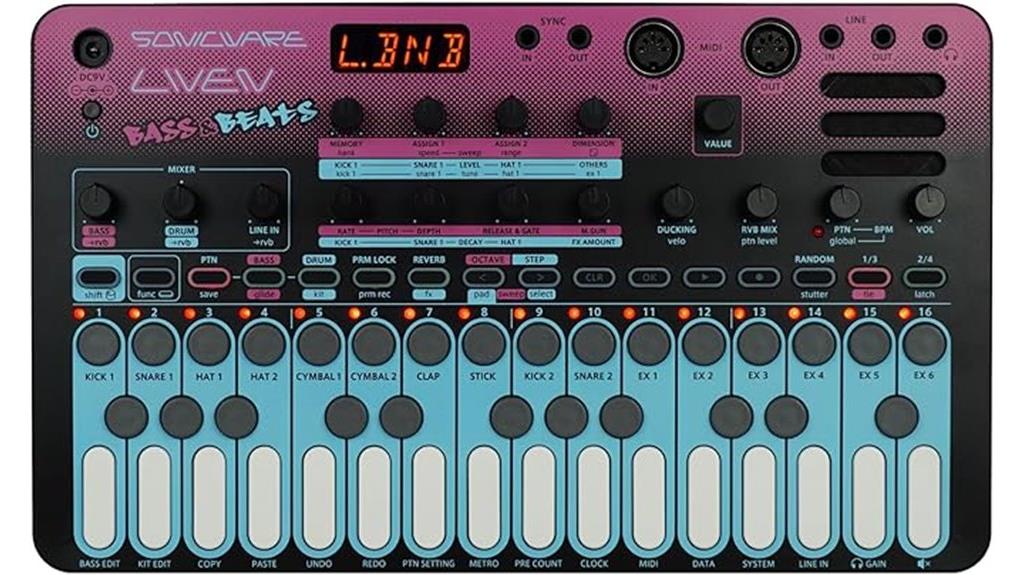
The SONICWARE Liven BASS&BEATS stands out as a compact powerhouse that’s particularly well-suited for hip hop producers who need genuine bass weight and crisp drum sounds in a portable package, combining a wavetable bass synthesizer with an all-encompassing drum machine in an 11.69 x 6.93-inch form factor. You’ll get 6 simultaneous voices total, using wavetable oscillation with sub-oscillators for bass alongside 350+ PCM rhythm sounds that deliver authentic hip hop textures. The built-in effects chain includes chorus, delay, distortion, and reverb options that’ll add professional polish to your beats, though the learning curve can be steep initially. MIDI connectivity guarantees seamless studio integration.
Best For: Hip hop producers and electronic musicians who need a portable groove box that combines authentic wavetable bass synthesis with comprehensive drum machine capabilities for creating beats on the go.
Pros:
- Powerful wavetable bass synthesizer with sub-oscillators delivers genuine bass weight and professional sound quality
- Comprehensive drum machine with 350+ PCM rhythm sounds and 100+ sound effects provides authentic hip hop textures
- Compact and portable design with MIDI connectivity ensures seamless integration into any studio setup
Cons:
- Steep learning curve and complex interface can be difficult for beginners to master initially
- Limited to 6 simultaneous voices total, which may restrict more complex arrangements
- Mixed user reviews indicate some reliability and user-friendliness concerns despite solid construction
Korg Volca Sample 2 Digital Sample Sequencer Drum Machine
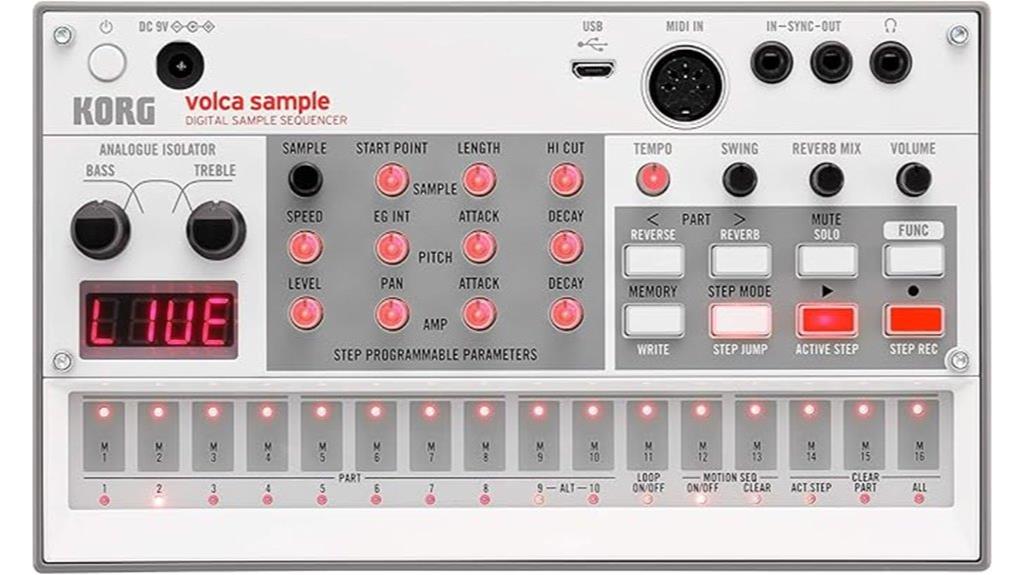
Compact powerhouses like the Korg Volca Sample 2 prove that serious hip hop production doesn’t require a massive studio setup, making this digital sample sequencer particularly appealing for bedroom producers and mobile beat makers who need professional capabilities in a portable package. You’ll get 8-voice polyphony with a 16-step sequencer, double memory capacity from its predecessor, and decent connectivity through micro USB for DAW integration. The built-in speaker works for quick sketches, though you’ll want headphones for serious work since the internal audio quality disappoints. At 13.1 ounces running on six AAA batteries, it’s genuinely portable, earning its #3 ranking among drum machines with 4.6 stars from nearly 4,000 users who appreciate its engaging workflow despite limitations in pattern storage.
Best For: Bedroom producers, mobile beat makers, and beginners who want a portable hip hop production tool with professional sequencing capabilities without needing a full studio setup.
Pros:
- Compact and portable design (13.1 ounces) with battery power makes it ideal for mobile production
- 8-voice polyphony with 16-step sequencer and double memory capacity provides solid creative potential
- Strong user rating (4.6/5 stars) and engaging workflow that’s beginner-friendly yet capable
Cons:
- Poor internal speaker quality requires headphones or external audio setup for serious work
- Limited pattern storage with only 8 memory slots restricts longer compositions
- MIDI limitations including lack of MIDI out and filter modulation capabilities
Vangoa Professional 25 Keys Midi Keyboard with 16 RGB Drum Pads
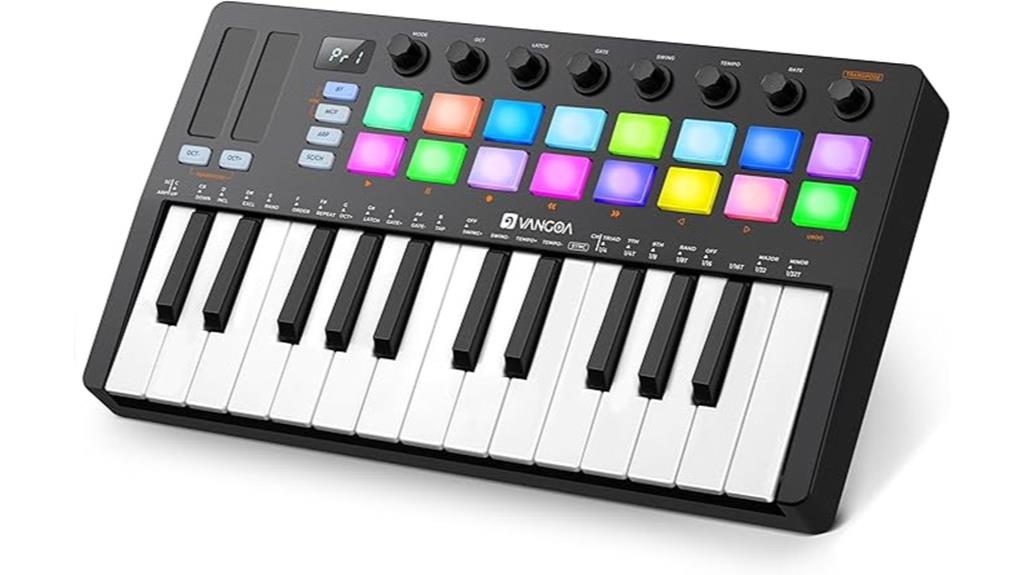
For aspiring hip hop producers who need professional-grade features without breaking the bank, I’ve found that the Vangoa Professional 25 Keys MIDI Keyboard strikes an impressive balance between affordability and functionality. At just 1.3 pounds, this compact powerhouse delivers velocity-sensitive keys, 16 RGB drum pads with aftertouch, and eight endless knobs for real-time control over your beats. While setup occasionally requires patience, particularly with Bluetooth connectivity, the plug-and-play USB compatibility works seamlessly with major DAWs like FL Studio and Ableton Live, making it an excellent entry point for producers exploring hip hop production.
Best For: Aspiring hip hop producers and beginners who want professional-grade MIDI keyboard features including velocity-sensitive keys, RGB drum pads, and comprehensive DAW compatibility at an affordable price point under $100.
Pros:
- Compact and lightweight design (1.3 lbs) with comprehensive features including 25 velocity-sensitive keys, 16 RGB aftertouch drum pads, and 8 endless knobs for real-time control
- Excellent compatibility with major DAWs (FL Studio, Ableton Live, Logic Pro X) across multiple platforms (Windows, macOS, Android, iOS) with plug-and-play USB connectivity
- Outstanding value for money with professional features like built-in arpeggiator, smart chords, and scale modes typically found in more expensive equipment
Cons:
- Bluetooth connectivity setup can be challenging and may require additional downloads and troubleshooting
- Limited to 25 keys which may feel restrictive for more complex musical compositions and advanced playing techniques
- Build quality and features may not satisfy professional producers who require more robust mid-range or high-end equipment for intensive use
Alesis SR-18 Studio-Grade Standalone Drum Machine
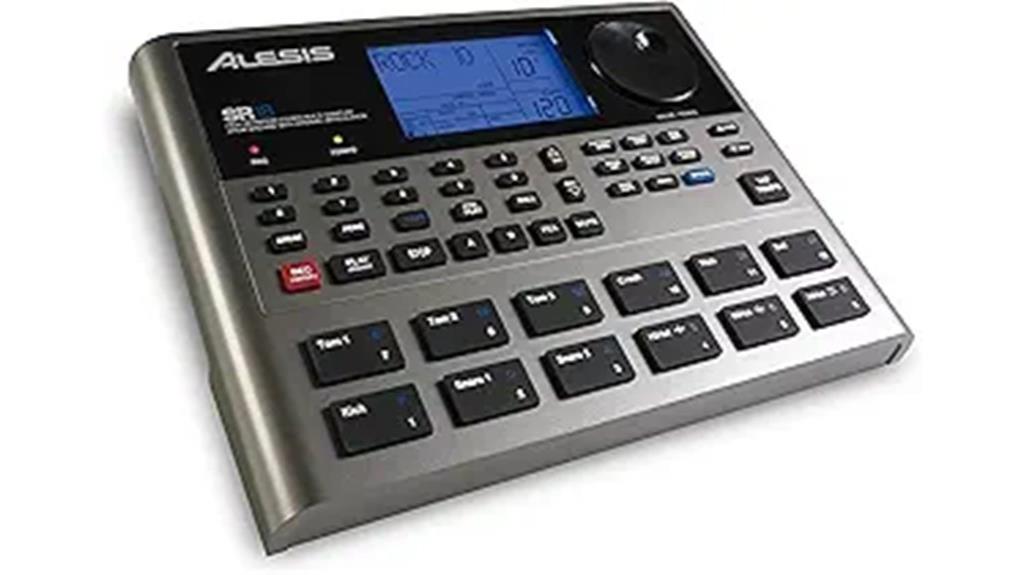
Producers seeking a versatile drum machine that excels beyond typical hip hop applications will find the Alesis SR-18 particularly appealing, since it delivers studio-grade performance with an impressive arsenal of 500 professional drum and percussion sounds, 50 bass sounds, and built-in digital effects. You’ll appreciate its Dynamic Articulation technology, which creates natural performance authenticity that translates well across genres, though it particularly shines in rock and metal contexts. The machine’s 12 velocity-sensitive pads enable creation of 200 custom patterns alongside 100 professional presets, while complete MIDI support guarantees seamless integration with your existing DAWs and electronic instruments for thorough beat production.
Best For: Producers, songwriters, and live performers who need a versatile drum machine with studio-grade sound quality that works well across multiple genres, particularly rock and metal.
Pros:
- Extensive sound library with 500 professional drum/percussion sounds, 50 bass sounds, and built-in digital effects for realistic audio production
- Complete MIDI support and flexible connectivity options enable seamless integration with DAWs, keyboards, and electronic instruments
- Dual power options (AC adapter or 6 AA batteries) provide portability for studio and live performance use
Cons:
- No direct computer interface connection, requiring auxiliary output to recording devices which may limit workflow efficiency
- Learning curve exists despite eventual ease of use, requiring familiarization time to achieve proficiency
- Compact dimensions (9.25 x 13 x 4 inches) may feel restrictive for users preferring larger pad layouts or more physical controls
Factors to Consider When Choosing a Beat Machine for Hip Hop
When I’m helping producers select their ideal beat machine for hip hop production, I focus on five critical factors that’ll determine whether you’re creating chart-topping beats or struggling with subpar results. Sound quality standards form the foundation of any serious setup, while sampling capabilities, sequencing features, and MIDI connectivity options shape your creative workflow and determine how seamlessly you can integrate with other equipment. Budget considerations inevitably influence every decision, but I’ve learned that understanding these technical specifications upfront prevents costly mistakes and guarantees you’re investing in gear that matches your production goals.
Sound Quality Standards
Excellence in sound quality separates professional-grade beat machines from amateur toys, and I’ve learned that understanding the technical specifications behind audio fidelity can make or break your hip hop production goals. When I evaluate beat machines, I focus on sampling rates of 44.1 kHz or higher, paired with 24-bit depth for crystal-clear audio representation that captures every nuance of your sounds.
Low latency becomes critical during live performance and recording sessions, ensuring your kick hits exactly when you trigger it without annoying delays. I also prioritize machines offering extensive effects libraries, including reverb and distortion, which expand your creative palette considerably. The ability to layer multiple sounds across individual channels while maintaining expandable sample libraries gives you the flexibility to craft complex, polished beats that meet today’s hip hop production standards.
Sampling Capabilities
Although technology has revolutionized hip hop production, I’ve discovered that a beat machine’s sampling capabilities remain the cornerstone of creative freedom, determining whether you’ll craft generic loops or develop signature sounds that define your artistic identity. I prioritize machines supporting multiple audio formats like WAV and AIFF, ensuring seamless compatibility with existing sound libraries and digital audio workstations. Having at least 16 pads proves essential for intuitive live sampling and performance triggering, while real-time sampling features allow me to capture spontaneous audio moments during sessions. Advanced machines offering sound layering and built-in effects like pitch shifting or time-stretching enable complex sonic manipulation, transforming simple samples into rich, textured compositions that separate professional productions from amateur attempts.
Sequencing Features
Since sampling forms the foundation of hip hop production, I’ve learned that sophisticated sequencing features become the architectural framework that transforms isolated sounds into cohesive musical narratives. I prioritize beat machines with versatile sequencing engines that offer extensive playback possibilities, enabling complex sound combinations that spark genuine creativity. A 16-step sequencer serves as my baseline requirement, providing intuitive pattern creation and editing capabilities that simplify my workflow considerably.
Multiple voice support proves essential for layered compositions, while programmable functions like pattern chaining, tap tempo, and drum rolls facilitate dynamic performances. I can’t overstate the importance of MIDI compatibility, which expands sequencing options dramatically and guarantees seamless integration with other electronic instruments or software platforms in my studio setup.
MIDI Connectivity Options
When evaluating MIDI connectivity options, I’ve discovered that versatile input and output configurations fundamentally determine how effectively my beat machine integrates with my broader production ecosystem. Class-compliant MIDI devices offer seamless compatibility across Android, iOS, Mac, and Windows platforms, eliminating driver headaches I’ve experienced with older equipment. I prioritize machines featuring dedicated MIDI IN and OUT ports, which provide essential flexibility for connecting external synthesizers, controllers, and sequencing devices during complex productions. Wireless Bluetooth connectivity has become increasingly valuable for cable-free setups, particularly during live performances where mobility matters. The precision control over velocity sensitivity, effects parameters, and sequencing capabilities through MIDI connections greatly enhances creative possibilities, making thorough connectivity options non-negotiable for serious hip hop production workflows.
Budget Considerations
Setting a realistic budget upfront has proven essential in my beat machine shopping experiences, as I’ve witnessed countless producers either overspend on features they’ll never use or settle for inadequate tools that stunt their creative growth. I’ve found the sweet spot typically falls between $200-600 for most hip hop producers, though beginner-friendly options start around $100 while professional units can reach $1,000. Don’t forget those sneaky additional costs I’ve learned about the hard way – software updates, sample packs, and essential accessories can easily add another $100-200 to your initial investment. I always check for student discounts and evaluate included software bundles, since many machines come with DAWs worth hundreds of dollars that greatly boost overall value.
Portability Requirements
Through countless studio sessions and countless more late-night beat-making marathons in cramped spaces, I’ve learned that portability can make or break your creative workflow, especially when inspiration strikes during a commute or you’re collaborating in someone’s bedroom-turned-studio. I prioritize machines weighing under two pounds with dimensions below seven inches in height, fifteen inches in width, ensuring they’ll fit in most backpacks without causing shoulder strain. Battery operation becomes non-negotiable when you’re jamming in parks or friend’s apartments without convenient outlets, while USB connectivity eliminates the headache of carrying multiple adapters and cables. Built-in speakers, though often overlooked, save precious bag space and setup time, letting you create immediately after unpacking your gear.
Software Integration Compatibility
Portability means nothing if your sleek, lightweight beat machine becomes a digital paperweight the moment you try connecting it to your laptop’s DAW, and I’ve watched too many producers discover compatibility nightmares only after unboxing their dream machine at home. You’ll want class-compliant MIDI devices that work instantly with Ableton Live, FL Studio, and Logic Pro X without hunting for obscure drivers. I prioritize USB connectivity for straightforward plug-and-play operation across Windows, Mac, iOS, and Android systems. Look for machines with dedicated librarian software that streamlines sample management and pattern organization, plus MIDI in/out ports that let you chain external controllers and instruments for expanded creative possibilities.
On a final note
Whether you’re starting with the affordable Donner STARRYPAD or investing in the feature-rich Korg Volca Sample 2, each machine offers unique strengths for different production styles. Consider your budget, workflow preferences, and technical requirements carefully before making your final decision.

